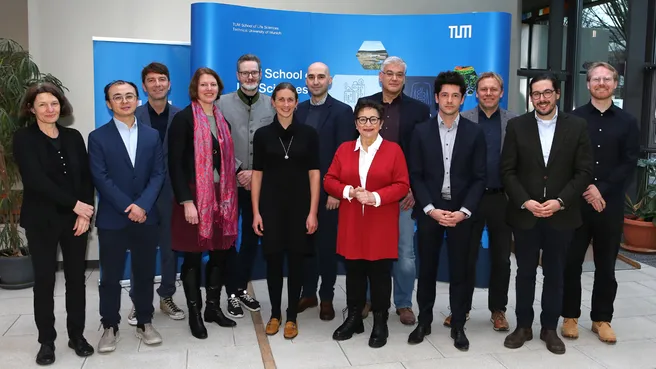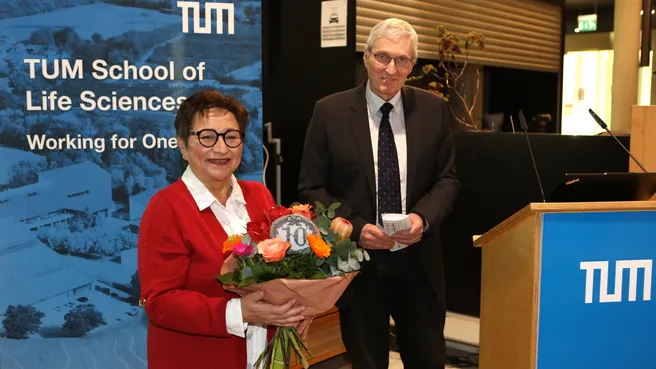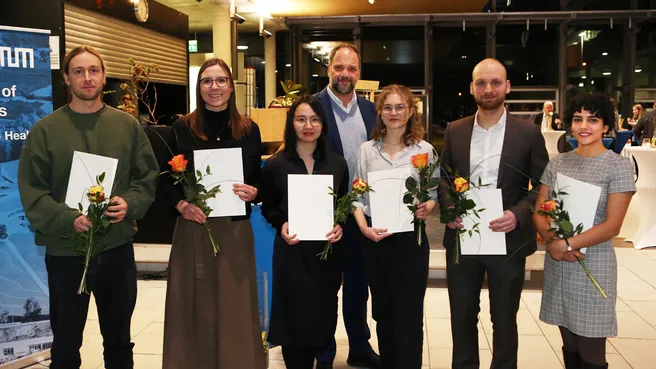“We are steadily growing,” Dean Ingrid Kögel-Knabner remarked at the beginning of her welcome address, reflecting on the numerous new appointments in recent years. The faculty has not only become younger but also more international and more female. “One of the key tasks in the coming years will be to forge a new scientific community together,” she emphasized.
The TUM School of Life Sciences reflects on an eventful year in 2024 and continues to advance the development of its campus with numerous projects. A key milestone was the presentation of the concept for the Agricultural Center to the Bavarian State Parliament: in collaboration with the Technical University of Munich (TUM), the University of Applied Sciences Weihenstephan-Triesdorf (HSWT), and the Bavarian State Research Center for Agriculture (LfL), an internationally leading agricultural research hub is set to emerge.
In September 2024, the topping-out ceremony for the new TUM Center for Infection Prevention (ZIP) was celebrated. As Dean Ingrid Kögel-Knabner noted, infection prevention is a key element of the School’s "One Health" strategy. The ZIP will establish an interdisciplinary research team working at the intersection of livestock and human health.
For 2025, several construction projects are planned with the aim of modernizing and sustainably designing the campus. These include the expansion of photovoltaic systems, roof renovations, and extensive greening measures at the Central Lecture Hall Building (ZHG). Improving the infrastructure to create an even more student-friendly campus is also on the agenda for 2025.
Top rankings and awards for Weihenstephan
“We are very pleased that our colleagues are receiving recognition for their work,” said Ingrid Kögel-Knabner, referring to the many awards received by the researchers and educators at the TUM School of Life Sciences. Once again, the research conducted in Weihenstephan garnered significant national and international attention last year.
For example, two professors from the TUM School of Life Sciences, Chris-Carolin Schön and Stephan Pauleit, were awarded the Environmental Medal of Bavaria. Additionally, ten of the 15 TUM researchers who are among the world’s most frequently cited scientists, according to the "Highly Cited Researchers" ranking, are part of the School's faculty.
The TUM also improved its standing in other global university rankings. In the Global University Employability Ranking, TUM ranks 1st in Germany and 13th internationally. In the field of agricultural sciences, TUM secured 8th place worldwide and 1st in Germany in the "Shanghai Rankings."
Numerous new appointments once again
The TUM School of Life Sciences was able to recruit eleven new professors last year. “The new colleagues, who bring new ideas and innovative research concepts, are a great opportunity for us,” emphasized Ingrid Kögel-Knabner. There is a clear generational change among the professors: around 40 percent of professors have been appointed in the last five years.
- The following were newly appointed last year:
- Prof. Alexander Bartelt (Translational Nutrition Medicine)
- Prof. Michaela Eder (Wood Science and Functionalization)
- Prof. Julien Gronnier (Plant Cell Biology)
- Prof. Stefan Guldin (Complex Soft Matter)
- Prof. Nadia Kamal (Computational Plant Biology)
- Prof. Richard L. Peters (Tree Growth and Wood Physiology)
- Prof. Katharina Scherf (Food Biopolymer Systems)
- Prof. Cornelius Senf (Earth Observation for Ecosystem Management)
- Prof. Bärbel Stecher (Intestinal Microbiome)
- Prof. Hristo Svilenov (Biopharmaceutical Technology)
- Prof. Peng Yu (Plant Genetics)
The TUM School of Life Sciences also welcomes two new associate professors: Martin Wiesmeier (Soil Science) and Ulrich Hammes (Plant Cell Physiology).
Prof. Wolfgang Wurst (Developmental Genetics) will retire after many years of service. He was honored for his services as TUM Emeriti of Excellence. As such, he will continue to make a valuable contribution to TUM.
At least nine new appointments are also planned for next year.
Award for the best Master's theses
Freising's Lord Mayor Tobias Eschenbacher was pleased about the good and close cooperation between the city and the university. This can also be seen in the Freising Science Slam, which was jointly organized by the city and the Weihenstephan science institutions for the first time last year, as well as in the long-standing lecture series TUM@Freising, where the citizens of Freising are regularly invited to exchange ideas directly with researchers from the university. In keeping with tradition, Eschenbacher once again presented the prizes for the best theses written by Master's students from the seven fields of study of the TUM School of Life Sciences. All theses were awarded the top grade of 1.0. Eschenbacher congratulated the young scientists with a personal laudatory speech and presented the prize money of 250 euros.
The award recipients of the City of Freising in the academic year 2023/2024 are: Anne Böhm (Agricultural and Horticultural Sciences), Julia Hagn (Biosciences), Jiahui Wang (Brewing, Food Technology and Bioprocess Engineering), Nooshin Mansouri (Nutritional Science), Alora Spring Kraus (Forest Science and Resource Management), Jonas Trotz (Landscape Architecture and Landscape Planning) and Sebastian Minas (Food Chemistry).
Further information:



